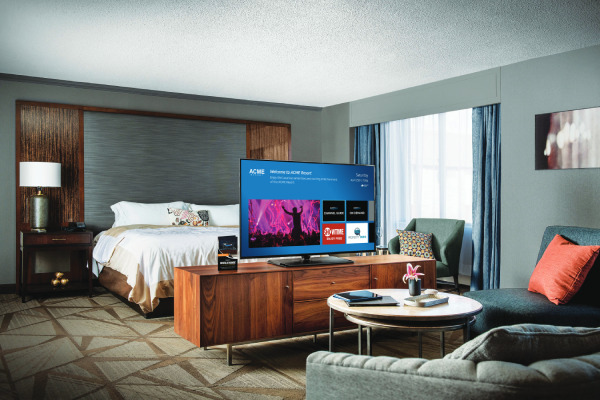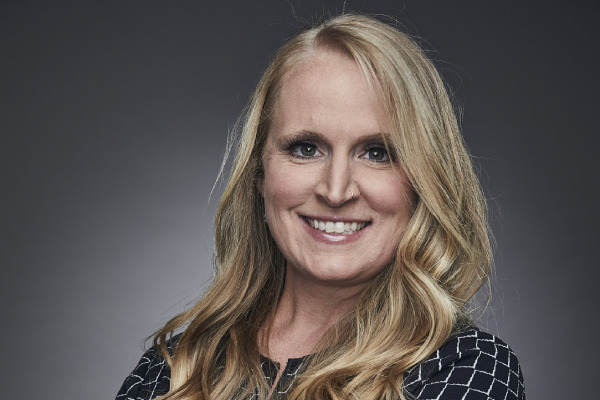Although travel sentiment has been climbing steadily, the pandemic and social distancing has resulted in travelers spending a significant amount of time inside their hotel rooms to limit their exposure to public spaces. Despite spending several long months at their homes, travelers still crave a “home away from home” ambience at hotels and look for convenient, flexible and customized options when it comes to in-room entertainment.
Thanks to the growing popularity of streaming platforms, the television still remains a powerful and most favored medium of entertainment, with travelers either watching the same or more amount of TV as compared to the pandemic. While there is a shift towards OTT and on-demand content, hoteliers said live TV is still the most consumed content.
“Our survey revealed that about 45% of travelers are watching the same amount of TV today than when the pandemic was in full effect, and over a third (35%) say they’re watching even more,” explained Kimberly Twiggs, assistant vice president of market development of DIRECTV. “What’s interesting from the research we’ve done is how much TV leisure travelers are watching and their in-room preferences: approximately 68% watch live TV in the hotel room, 84% say they’d choose a hotel based on it offering easy access to local, live, and on-demand TV and music, and 74% would pay more for these features.”

Contactless convenience, privacy and personalization are at the core of guest experience. Travelers now look for solutions to transform their rooms into a smart hub using mobile technology.
“We’ve all gotten used to the convenience-centered solutions implemented during the pandemic. We don’t want to wait in a crowded lobby, fumbling with luggage – today’s guests will expect to have a mobile key, their favorite channel on the TV and the lighting and climate set to their preferences, all before they even enter the hotel,” said Robert Grosz, executive vice president and chief commercial officer, World Cinema. “Hoteliers need to ensure they’re providing personalized experiences for guests during their stays. The Internet of Things (IoT) will also continue to be a big player in the hospitality industry.”
Besides empowering guests to control their environment, IoT also enables hotels to utilize occupancy sensors, leak detention and monitor air flow to help with sustainability initiatives. “These innovations as well as casting, voice control and hyper automation can be added incrementally at any time to properties, without redundant costs,” Grosz added.
Baseline, luxury requirements
People now consume more content for longer periods than ever. Ensuring quality, reliable and high-speed WiFi has become a priority for hoteliers. Today, guests use an increased amount of internet bandwidth for video chatting and conducting video meetings, using cloud-based apps, playing games and streaming content. According to DIRECTV’s research, 84% of consumers use in-room Wi-Fi often or always and 89% of consumers said room Wi-Fi was too weak to stream.
“This all means that quality in-room entertainment and fast, reliable Wi-Fi are even more important for today’s guests who have shifted their habits and are spending more time in their rooms while entertainment opportunities outside the hotel are still recovering. Reliable guest Wi-Fi is non-negotiable,” said Kara Heermans, senior vice president of user experience and product management, SONIFI.
Besides providing HD, updated, interactive in-room TVs, providing a secure and reliable internet connection, is also crucial for hoteliers. Secure, strong and property-wide internet connection is essential for hoteliers looking to upgrade their tech stack and ensure repeat bookings. While internet has become a basic amenity expected by guests, irregular and slow connection can become a cause of major dissatisfaction.
Beyond the baseline expectations, guests also seek luxury options that provide a better-than-home experience. “Things like on-demand movies, on-demand fitness, and contactless concierge experiences are very popular. Because guests are spending more time in their rooms — due to safety concerns or using the room as a remote office — these surprise-and-delight TV features are in demand more than ever,” Heermans said.

Since a lot of health clubs and gyms were closed during the pandemic, there is a growing demand for on-demand meditation/yoga sessions and workouts that can be done from the comfort of the hotel rooms.
Guests’ familiarity with technology is important and ultimately drives guest satisfaction, said Harsh Patel, president and co-owner of San Antonio, Texas-based BH Hospitality Management. As guests become more comfortable with controlling the TV through their phone and using smart, contactless features, these methods will become a baseline expectation going forward, he said. “Having a strategic technology strategy in place also enables properties to quickly adapt to new technology advancements to meet the ever-evolving needs of guests. Staying ahead of the trends allows hotels to be more competitive in the industry while also increasing guest satisfaction and loyalty.”
While these in-room options are crucial for guest satisfaction and repeat bookings, how cost-effective are these solutions? It all really depends on a hotel’s current situation and their goals for the next few years, Heermans said.
“There are some hotels that are still struggling with staffing or occupancy, so looking for not just cost-effective but cost-saving ideas is a valid discussion,” she elaborated. “But if your property is in a position to look to the horizon of what your guests want, it’s important to look at in-room entertainment costs not just in per-room, per-month terms, but in a mindset of investing in the promise of your brand to your guests for years to come.”
While consumers should not be paying a premium for these services, it’s not something that’s going to break the bank, said Ravi Patel, CEO of Colonial Heights, Virginia-based SINA Hospitality. “All brands have their certain standards that hotel owners have to abide by but understanding guests and their customer journey will help not only the brands but the owners depict what entertainment options can be most cost effective,” he said.
The idea behind new technologies is to work with a vendor who can build a foundation for hotels so that additional technologies can be incorporated at little or no cost. It is imperative to work with a vendor who doesn’t try to fit your hotel into a template, said BH Hospitality Management’s Patel. “Solutions should be adapted to a hotel’s specific needs, plus have the ability to scale should a hotel’s needs change. Investing in technology solutions is a commitment that allows hoteliers to provide unique experiences to their guests and cater to evolving preferences – this is why customized solutions matter.”
What’s next
At the end of the day, familiarity with technology and customization is key for guest experience. Hoteliers should focus on adding channels, personalization and experiences that make the most sense for their demographic, like incorporating family channels at family-focuses hotels, while ensuring in-room entertainment options are flexible enough to cater to different types of travelers. Most guests want options for casting their own streaming services directly to the in-room TV with minimal effort.
“Today’s travelers are expecting the technological comforts of home to bleed into their hotel stays,” explained Sonya Jamula, head of hospitality, DISH. “Travelers carry seemingly endless content when they travel, and they want to seamlessly watch that content in their hotel room on a high-quality HDTV, on their schedule. Tremendous value and customization can be derived from tapping into consumers’ needs and providing them with the comforts of home, along with flexibility. Tomorrow’s guest room entertainment is all about choice, which is both personalized and innovative that can drive property and brand loyalty.”
Interactive PMS-integrated guides, streaming, and casting are some of the ways that hoteliers can drive customer loyalty and adapt to the mobile revolution that has become the norm today, she said.

At DIRECTV, Advanced Entertainment Platform — a content delivery solution that provides DIRECTV linear satellite, free-to-customer app-based content, and on-demand content — is core to the company’s strategy of delivering what guests want, Twiggs said. The system reduces the complexity of multiple logins for multiple services and revolutionizing in-room entertainment with one aggregated, consistent experience.
Automation and machine learning have helped World Cinema design their systems, which integrates into a hotel’s existing PMS platform and creates a seamless experience for both staff and guests. Instead of catering to all types of guests, Grosz said World Cinema caters to guests as individuals, paying attention to their preferences like room temperature and TV usage.
“Guest preferences are automatically stored in the system and activated when the guest checks in (whether that is in person or remotely),” Grosz added. “Automated solutions are both cost effective and helpful for staff as they take on administrative, time-consuming tasks. When properties utilize machine learning and artificial intelligence correctly, staff are empowered to interact with guests on a personal level to deliver the quality guest experience we’ve all become accustomed to.”
The future of in-room technology extends far beyond imagination. With the advent of advanced technologies like QR codes, augmented reality and metaverse, guests’ expectations will keep evolving, at a much faster pace. Hotels need to ensure their network and applications can accommodate the influx of such fast-changing technological advancements.